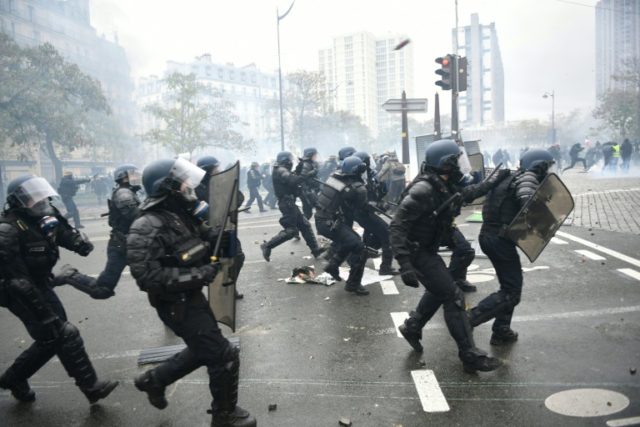Paris (AFP) – French police used tear gas and detained dozens in Paris on Saturday as fierce clashes broke out in demonstrations marking the first anniversary of the yellow vest protest movement seeking to challenge President Emmanuel Macron.
Yellow vest protesters are planning a series of nationwide demonstrations this weekend in a bid to prove their movement is still a force to be reckoned with, one year after the first giant demonstration on November 17, 2018.
Numbers attending the protests and levels of violence have sharply diminished in recent months from the height of the movement, which began on the back of frustration Macron was failing to address the needs of ordinary French.
But Saturday’s protests — which demonstrators called “Act 53” of their weekly gatherings — marked the first serious clashes for months in central Paris between security forces and demonstrators.
Tensions were focused on the Place d’Italie square in southeast Paris, where police wielding shields and truncheons flooded the area in a cloud of tear gas after stones were thrown, rubbish bins set on fire and an overturned car put ablaze, AFP correspondents said.
Paris police chief Didier Lallement banned that demonstration and said that 61 people had been detained so far across the capital.
“The damage and the systematic attacks against the security forces and the fire brigade have forced me to ban this demonstration,” he said.
“We are a bit disappointed that this has descended into violence,” said Laurent, 50, who had come to Paris from Meurthe-et-Moselle in the east of France to mark the first anniversary. “We are going to look for a quieter place.”
– ‘Still in the street’ –
The yellow vests want the actions on Saturday — their traditional day for protests — and also Sunday — the anniversary day — to remind Macron they have not vanished from the scene.
“We’re here even if Macron doesn’t like it,” demonstrators chanted as they arrived on the outskirts of Paris Saturday, with others singing “Happy Birthday”.
Several metro stations were closed in the capital and police were deployed in numbers, especially along the Champs-Elysees, which was again closed off to demonstrators following the ransacking of shops that followed a protest last March.
France has a long tradition of violent protest, but the ferocity of last winter’s demonstrations and allegations of police brutality shocked the country.
A poll by the Elabe institute published Wednesday said 55 percent of French people support or have sympathy for the yellow vests, although 63 percent said they do not want the protests to begin in earnest again.
The most prominent figures in the movement, which has explicitly shunned any formal leadership structure, acknowledge the declining numbers but say the authorities’ response has not been sufficient.
“We shouldn’t still need be on the street one year on,” said Priscillia Ludosky, an entrepreneur whose online petition against high fuel prices helped kick off the movement.
“It’s unfortunate there has been no political response, but also to see that we are slightly lacking energy in terms of mobilisation,” she told the Regards news site.
– ‘Cry of suffering’ –
The yellow vests — named for the glow-in-the-dark waistcoats all French drivers must carry in their cars — posed the biggest challenge to Macron since he swept to power in 2017 on the back of promises of sweeping change.
Initially taken aback by the size and intensity of the movement, Macron offered billions of euros in state aid and tax breaks — and scrapped a planned fuel tax hike — while embarking on a “Great National Debate” at town halls nationwide.
He has also tried to soften his sometimes abrasive style. Just weeks before the protests erupted, Macron told a 25-year-old man looking for a job in Paris that “if I crossed the street I’d find you one”.
“The yellow vests opened our eyes to the reality for millions of people,” Economy Minister Bruno Le Maire said on Friday, adding that the government wanted to respond to this “cry of suffering”.
Apart from Paris, protests also took place in cities including Rouen and Caen in Normandy as well the eastern city of Lille where hundreds protested. But so far there were no reports of violence outside of the capital.
The next major street challenge to Macron, however, may not come from the weekend’s protests but a strike called by unions on December 5 to rally against his planned pension reforms.
burs-sjw/har

COMMENTS
Please let us know if you're having issues with commenting.